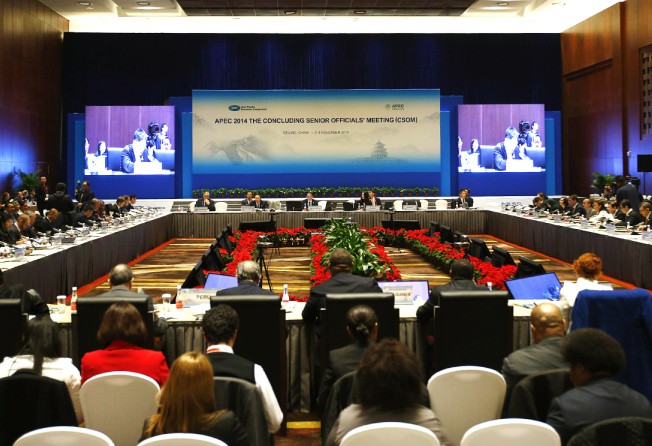Apec tries to keep ball rolling as group marks 25th anniversary
As group prepares to meet in Beijing and China pushes for regional economic integration, many of its achievements have gone unrecognised

The Apec party has begun. Beijing's polluted skies have been cleared. Hotels are bedecked with welcoming regalia. Security hovers discretely on nearby street corners. China's leadership has injected huge energy into making the year a memorable one, conscious of this year's milestones - Apec's 25th anniversary, and the 20th anniversary of the "Bogor Goals" which set the 21-economy group a target of free and open trade and investment by 2020.
So has the year lived up to best hopes? The brutal answer must be no - although not for want of trying. And when the region's leaders meet at the weekend - putting Vladimir Putin, Shinzo Abe, Barack Obama and Xi Jinping together in one room - the frisson is going to be palpable. The global economy is still spluttering, Japan's shock new quantitative easing has rattled nerves about the strength of its recovery, China's economy is growing at its slowest pace since 1990, Obama is staring lame-duck status in the face, tensions over Ukraine make it unclear whose hand Putin will be willing to shake, and half a dozen Apec members are at loggerheads over rocks in the South China Sea. Apec's leaders have never previously met against such a conflicted backdrop.
When China took over the chairmanship of the Asia-Pacific Economic Cooperation forum from Indonesia in January, it set an ambitious three-pronged agenda: regional economic integration, economic reform and innovative development, and building infrastructure and regional connectivity.
From the outset, regional economic integration was in jeopardy. China wanted its main deliverable to be an Apec commitment to a free-trade area of the Asia-Pacific (FTAAP) that would by 2025 embody Bogor's free and open trade and investment vision. It was brave, as the US and others negotiating the transpacific partnership (TPP) have been adamant that no regional initiative should jeopardise TPP.
Beijing's cold dry air has crackled as China and the US have arm-wrestled over FTAAP. Days before the leaders meet it is unclear what will be agreed. American hopes that a TPP deal could be cut by the time of the Apec party have come to nothing, and Washington is unlikely to commit to FTAAP until TPP is sealed. How face will be saved is not clear.
On the infrastructure front, China will claim major progress. A new Asian Infrastructure Investment Bank will work alongside the World Bank and the Asian Development Bank to improve investment flows into regional infrastructure.
Beijing will declare victory too on connectivity. A fascinating and ambitious new "connectivity framework" has been forged which will cluster much Apec work into three key areas - physical connectivity, institutional connectivity, and people-to-people connectivity. It will be left to the Philippines as Apec chair next year to put flesh on the bones of this framework, but it could be a genuinely interesting new approach to regional integration.
China will also claim credit for significant progress by finance ministers on the post-2008 efforts to build deeper and more transparent capital markets in Asia, based on insights from the financial crisis.
There have been numerous other markers of progress that no outsider will much care about: supply chain efficiency, liberalising services, developing the "blue economy" - shipping, fishing, seabed mining, coastal tourism, and so on.
As someone who spends more than 80 days a year in unglamorous Apec meetings in unglamorous cities across the region, it is mildly irritating to be here in Beijing and to recognise that for most people, the Apec party of the coming few days, with its funny-dress photo-ops, is what Apec amounts to - an inconsequential talk shop.
In truth, the real value of Apec lies elsewhere - in unsexy workshops where top officials learn from each other, and without the distraction of political theatre, help to train officials to implement the liberalisation initiatives embodied in high-sounding "leaders' declarations". But this doesn't make headlines. It does not get the pulse pumping in the way that putting Putin and Obama in the same room together will do. So I will go with the flow, dress appropriately smartly for the party, and hope Beijing's pollution does not fog the show.
David Dodwell is the executive director of the Hong Kong-Apec Trade Policy Group